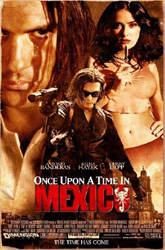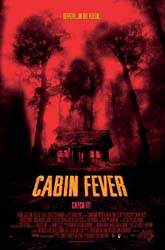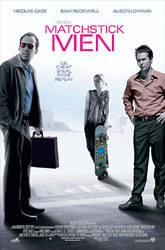 Director: Starring: Release: 12 Sep. 03
|
Once Upon a Time in Mexico BY: DAVID PERRY Robert Rodriguez receives 9 credits in his latest film, Once Upon a Time in Mexico: visual effects supervisor, camera operator, production designer, producer, cinematographer, editor, composer, director, and writer. Like his first film, El Mariachi, Rodriguez uses his many hats to make a distinctive vision, something that has a semblance of a single mindset across its many elements. This is a great thing when confronting an auteur’s quality of work, and it should, theoretically, have a direct correlation among all the elements and their value. But maybe there’s such a thing as too much: a filmmaker overwhelming his film with so many like qualities that the overall worth is hurt. Alfred Hitchcock, a director who never worked in any other capacity of his films, had a manifest touch in every element of them. Rodriguez, it might be thought, could have simply spread himself too thin; the screenplay, after all, was still being written when production began. And yet, from a merely formalist point of view, Once Upon a Time in Mexico is a good film. Looking beyond its apparent errors (most clearly seen in its barely understandable story), the film is pure, scatterbrained entertainment. Its puerile qualities are also its best defined qualities, and the unabashed pride with which Rodriguez deploys them is masterful. The film is pure camp with the bright sheen of a Nordstrom’s price tag. But, considering its $50 million budget, even when compared to El Mariachi’s famed $7,000, Once Upon a Time in Mexico is a fairly frugal production for a Hollywood action film (of course, that’s what happens when the work of 9 positions was filled by one staffer). Quentin Tarantino, a close friend of Rodriguez who has a similar guerilla style, has long seen a Sergio Leone beauty in El Mariachi and Desperado, requesting that Rodriguez up the spaghetti-Western feel for a third film. Once Upon a Time in Mexico (mimicking the name of two Leone masterpieces, Once Upon a Time in the West and Once Upon a Time in America) has been advertised as the concluding chapter in what is called the El Mariachi trilogy (itself a bit of mimicry on Leone’s Man with No Name trilogy including A Fistful of Dollars, For a Few Dollars More, and The Good, the Bad and the Ugly). Getting past the fact that Desperado is little more than a flashier remake of El Mariachi, the lead is again a near silent troubadour whose musical talents are only eclipsed by his ability to kill. Now avenging the deaths of his loved ones, El (Banderas), as he is called (although that would mean his nickname is ‘The,’ meaning Robert Benigni would be Il from Il Monstro and Josette Day and Jean Marais would be La and Le from La Belle et le Bête), is absent through much of the film because the work follows multiple stories that will all converge in the end, if not sooner. His enemy is a drug dealer (Dafoe) who ordered the attempted murder on El that killed his wife (Hayek; in an over-promoted cameo) and child. Meanwhile, the drug dealer is preparing a plot that will facilitate in the coup of the current Mexican president for replacement with a corrupt general in the Mexican army (Vigil). At the same time, both a federale (Mendes; beautiful as ever, vacuous as ever) and a retired FBI agent (Blades) are each trying to get their own opening into the operation. And the man helping in all this, trying to use the work of everyone else in the name of American interests, is a bizarre CIA agent named Sands (Depp), who wears shirts proclaiming his employer and “I’m with Stupid” shirts that point to his crotch. He is, in most ways, the main character, although the ensemble size of the film keeps him from taking up most of the screen time. The same is not true for the character’s impact on the audience. For the second time this year, Depp steals the show from every one else in a fairly large, fairly prestigious cast. Like in Pirates of the Caribbean, most of his nuggets seem to come straight from improvisation, including a less than veiled reference to one of Captain Jack Sparrow’s favorite terms. How is it that an actor, before only seen as the great go-to guy of Tim Burton, has become the best thing about summer cinema in 2003? Without a doubt, his work here is testament to what an actor can do with only slightly interesting dialogue. Where most actors, including such greats as Dafoe and Blades (Banderas would deserve mention here for his Spanish work but has yet to fully shine in any of his English-language films), seem to be merely pawns in Rodriguez’s beautifully structured frames (it’s the first film shot on digital to compare to All About Lily Chou-Chou in cinematographic impact), Depp comes off as a complete independent from his director's aims. Depp, in only one capacity,
does more for Once Upon a Time in Mexico than Rodriguez does in 9. But,
considering how great this actor has been this year and the past, as well as
what Rodriguez has done in the past (the painfully bad The Faculty and
From
Dusk Till Dawn, the appealing Spy Kids films), it’s safe to say that even if
Rodriguez centralized all his efforts in one field, the greatness would
still lie in Depp, the man who saved Hollywood summer ‘03. |
|
| ©2003, David Perry, Cinema-Scene.com, 12 September 2003 | ||


